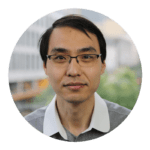This website uses cookies so that we can provide you with the best user experience possible. Cookie information is stored in your browser and performs functions such as recognising you when you return to our website and helping our team to understand which sections of the website you find most interesting and useful.
Wei Wei, PhD
Science Transforming Health
Wei Wei, PhD
Andy Hill CARE Distinguished Researcher & Associate Professor
 isbscience.org/bio/wei-wei/
isbscience.org/bio/wei-wei/
Dr. Wei Wei is an Associate Professor at the Institute for Systems Biology. He also has the position of Affiliate Faculty at the Molecular Engineering & Sciences Institute of the University of Washington. He received his B.S. in Fundamental Sciences (Mathematics and Physics) at Tsinghua University (Beijing) and M.S. in Materials Sciences and Engineering at UC San Diego. He obtained his Ph.D. at California Institute of Technology in 2014 with cross-disciplinary training that included both physical and biological sciences. Before joining ISB, Wei was an Assistant Professor at UCLA until mid-2018.
Wei received the Chinese Government Award for Outstanding Student Abroad in 2013. In 2014, he was the sole recipient of the Milton and Francis Clauser Doctoral Prize – the highest honor for a Caltech Ph.D. He received the Andy Hill Cancer Research Endowment Distinguished Researchers award in 2019. Dr. Wei has been serving as either program director or project lead in various nationwide cancer research consortium-funded projects. Some of these initiatives include the NCI-funded ISB/UCLA Physical Sciences in Oncology Network Program (PS-ON), ISB/UW Innovative Molecular Analysis Technologies (IMAT) program, ISB/UCLA Centers of Cancer Nanotechnology Excellence (CCNE) program, and ISB/Yale/UCLA Cancer Systems Biology Consortium (CSBC) program.
Wei’s research interests reside in a highly cross-disciplinary field of BioMEMS, molecular and cellular analysis, and systems biomedicine. The overarching goal of the Wei Lab is to harness systems biology thinking and approaches to address critical questions and cultivate new understanding in both fundamental and translational cancer research. In cancer biology, the primary focus lies in understanding the phenotypic plasticity of cancer cells and its role in fostering non-genetic (adaptive) drug resistance, a form of resistance distinct from the Darwinian selection of resistant genotypes. The goal is to elucidate how cancer cells coordinate their internal molecular machinery to adapt to therapeutic stress and to understand how these adaptive changes evolve within the heterogeneous tumor and are modulated by the tumor microenvironment (TME). The lab scrutinizes this process across multiple molecular landscapes and at various temporal resolutions, to gain comprehensive insights at both mechanistic and systems levels. This line of inquiry also propels the development of innovative single-cell multi-omics and spatial multi-omics tools. On the translational research front, the lab is committed to advancing liquid biopsy-based predictive cancer diagnostics through the lens of disseminated/circulating tumor cells (DTCs/CTCs), and to revolutionizing functional precision medicine with needle biopsy-based organotypic drug sensitivity assays as companion diagnostics.
Single-cell/spatial multi-omics, cancer epigenetic plasticity, non-genetic drug resistance, functional precision medicine, cancer molecular diagnostics
2014 Ph.D. in Materials Sciences, California Institute of Technology
2008 M.S. in Materials Sciences and Engineering, UC San Diego
2005 B.S. in Fundamental Sciences (Mathematics and Physics), Tsinghua University
Wei Lab
Institute for Systems Biology
401 Terry Ave N
Seattle WA 98109
Email: wwei@isbscience.org


